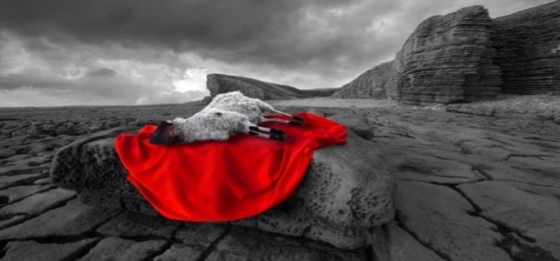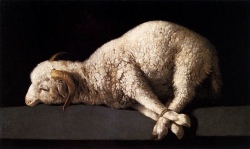skip to main |
skip to sidebar
BLOOD SACRIFICE: Why Is Sacrifice Important to God?
One
of the most common criticisms leveled against Christianity is the
argument that this “God of love” is, in reality, a violent, bloodthirsty
deity with an unhealthy appetite for blood sacrifice. After all, what
sort of God connects forgiveness with the slaughter of innocent animals?
Were blood sacrifice in vogue today, we certainly would be guilty of
any number of animal rights violations, not to mention that modern
psychology identifies the killing of animals to be an early marker for
sociopathy. When seen from our modern vantage point, the blood sacrifice
of the Old Testament is an understandable issue.
Definition of Sacrifice
In
fact, the first seven chapters of Leviticus are replete with the laws
concerning various forms of animal sacrifice. These are:
-
Burnt offerings, whereby the animal is sacrificed, drained of blood, and then completely consumed by fire.
-
Grain
offerings (sometimes referred to as meat offerings in the KJV, as the
Old English definition of ‘meat’ often referred simply to food), whereby
grain or other foods from the field are presented and consumed by fire.
-
Peace
offerings, whereby an animal is sacrificed, cleaned, cooked on the
altar, and eaten as a shared meal. This is most typically a lamb.
-
Sin and guilt
offerings, whereby a priest offers a blood sacrifice on behalf of the
sin of another, the offering is then cleaned, cooked, and eaten by the
priesthood.
The
very fact that the opening seven chapters of Leviticus detail
specifically how these are to be done belies the significance which
blood sacrifice had to ancient Israelite worship. It still leaves the
question unanswered, however… why does God demand blood sacrifice?
Animal Sacrifice
To
get to the heart of this, we have to backtrack. The birth of monotheism
was with Abraham*, as God revealed Himself and made covenant. It was
this covenant which eventually brought forth Israel. In the ancient
world, however, covenant was signified through sacrifice. An animal
would be killed, its lifeblood drained, and the carcass cut in half. The
two individuals making the pact would then walk, together, between the
two halves of the slain animal, which signified the gravity of the vow
they had made. The implication was that, should either of them violate
the covenant, may the one in violation fall victim to the same fate
which befell the slain beast before them. Covenant was a big deal.
So
it was that, when God made covenant with Abraham, He did it in the only
manner which Abraham understood – through sacrifice. This is important,
because it reveals an aspect of God that is central to Christian
theology: God meets us where we are, and leads us forward.
Sacrifice, from this point forward, was centered around the covenant
which God made with Abraham. Burnt offerings and grain offerings were
offerings of livelihood, offering up to God that which we rely on,
reminding us that our hope is found in God alone. Sin and guilt
offerings were offerings of covenant restoration, offered on behalf of
the priesthood, restoring those who had violated the covenant back into
relationship with God. Peace offerings were similar, but directed at the
community. The sacrificed animal would be cooked and the meal shared,
that relationship with one another may be restored.
Of
course, God was very clear to set limits on sacrifice, and would
eventually deal with the practice itself. When Abraham was sent to offer
up Isaac, his son, this was a matter of establishing proper boundaries
for sacrifice. There, in Canaan, it was common practice to sacrifice the
first-born child to one of the pagan gods, in the hope of slaking the
deity’s wrath and preserving the lives of future children in a time
where infant mortality was abysmally high. God, through Abraham’s
obedience, changed this practice for His followers. Sacrifice was
limited to animals that were sources of food, not children. By the
Exodus, in fact, sacrifice was explicitly linked to food offerings, as
the lamb slain at Passover was to be eaten as part of the ritual. In
time, however, even the covenant meaning which was the basis for blood
sacrifice became lost, and animal sacrifice was reduced to a ritual.
Thus, by Hosea, we hear the lament of the Lord, “For
I desire steadfast love and not sacrifice, the knowledge of God rather
than burnt offerings. But like Adam they transgressed the covenant;
there they dealt faithlessly with me.” (Hosea 6:6-7)
The End of Blood Sacrifice
So
it was that Jesus ended sacrifice for all time. The covenant with
Abraham was that God would make him the father of many nations, and that
through him all the nations of the earth would be blessed. The
fulfillment of that covenant was met in His son, Jesus. The
quintessential blood sacrifice under the Old Covenant was represented in
the Passover lamb. This lamb would be brought forth three days prior to
Passover, and observed for three days to make sure it was without
blemish or defect. On the third day, Passover Eve, the lamb would be
sacrificed, drained of blood, cooked, and eaten with bitter herbs.
Through this, it was remembered how the blood of the lamb protected the
children from death in Egypt, and set them free from their slavery.
Jesus
entered Jerusalem three days prior to Passover. For three days He was
tested by Caiaphas, Annas, the Pharisees, the Sadducees, the teachers of
the law, and finally Pontius Pilate… who declared that he found nothing
wrong with Jesus. On Passover Eve, the Lamb of God was sacrificed on a
cross, so that by His blood the angel of death may not claim us and we
are set free from our slavery to sin. Jesus became the perfect sin
offering.
The
night He was betrayed, He broke bread, announcing it to be His body,
broken for us. He took wine, and, giving thanks, offered it to us as His
blood of the New Covenant. Through Eucharist, we partake of Jesus as
the perfect peace offering.
The
only offering remaining was the burnt offering and the grain offering –
the offering of livelihood, freely given to remind us that our
provision is found in God alone. This we still practice, but it is
instead found in the offering of our livelihood delivered into a little
wooden plate passed around on Sunday morning. Our livelihood has
changed; so the offering has changed to match.
Blood
sacrifice was necessary because it reflects a God who meets us where we
are at and leads us from there. Blood sacrifice is complete, perfectly
fulfilled, as the Lamb of God, the perfect sacrifice, offered Himself
once for all. God still meets us where we are at. Hopefully, we still
follow as He leads us home.
*Some
scholars argue that monotheism began with Zoroastrianism in the Persian
Empire, not with Judaism. These arguments are dependent on a late-date
hypothesis pertaining to the penning of the Torah. There is significant
grounding for an early-date authorship, however, which dates the penning
of the opening books of Scripture to the Exodus or shortly thereafter.
If we accept the early date, then Judaism preceded Zoroastrianism by
nearly 600 years, and the birth of Zoroastrianism can be traced to the
period of Israel’s captivity in Persia. During their captivity, Israel
would certaily have exerted significant influence on the cultural
philosophy out of which Zoroastrianism was born.
17 April 2012














No comments:
Post a Comment